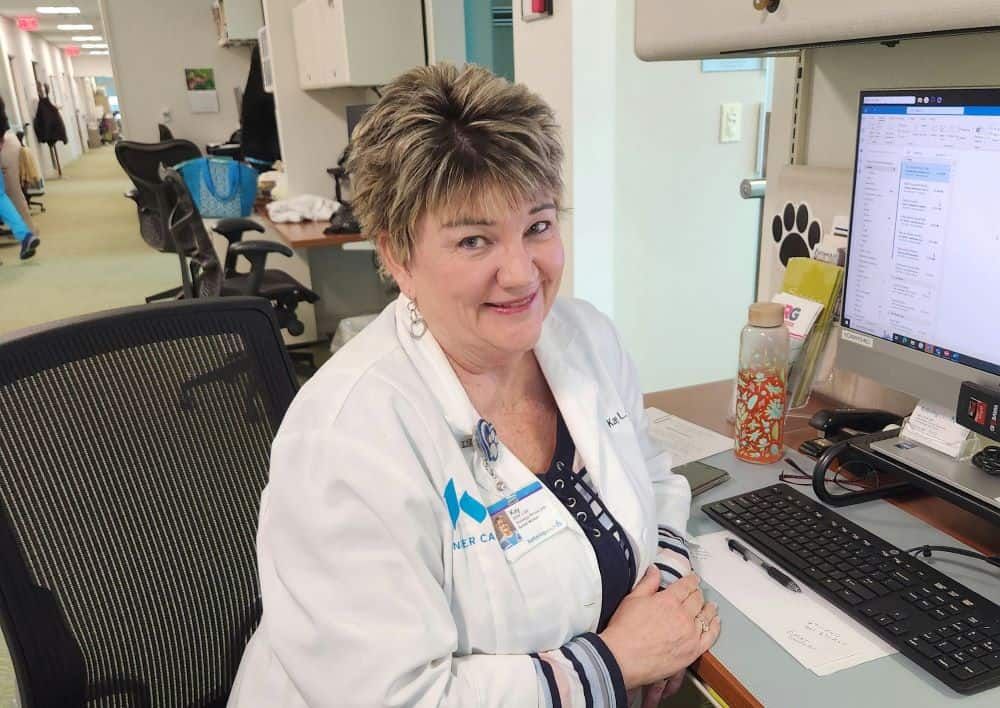Cancer Care
Want to learn more about this at Kettering Health?
At a Glance
Q: How can I support a loved one with cancer?
A: Offer consistent, thoughtful help and let them guide conversations. Avoid judgment and dismissive comments—focus on being present.
- Don’t compare their experience or promise everything will be fine.
- Keep regular contact and offer specific help, like meals or errands.
- Thoughtful gifts and planned visits show care and respect.
Cancer patients can benefit from a strong support system of family, friends, neighbors, and colleagues. But often, people aren’t sure what to say or do when their friend or loved one has cancer.
Oncology social worker Kay Finch and two cancer patients share their advice.
Verbal Do’s and Don’ts
One of the most common missteps is when a friend tells the patient a story about another person’s experience with cancer – especially when the outcome was negative.
“Always be positive and avoid negative outcomes you might know about,” says John Salvatore, 82, who was diagnosed with chronic lymphocytic leukemia at the age of 71. “Not all cancers are fatal. The person with cancer needs to have people around them who are uplifting and helpful.”
You should also avoid saying “I know exactly how you feel.”
“Comments like these, although well intended, are just not helpful, especially to someone newly diagnosed with cancer,” Kay explains. “Each person’s cancer journey is unique and it’s not possible to know exactly how someone else is feeling.
“Instead, say ‘I can’t begin to understand, and I don’t know what to say, but whatever happens, I am here for you.’”
Kay also cautions it’s not helpful to praise a cancer patient for how strong they are. The same goes for telling them everything will turn out fine.
“It’s just kind of dismissive of what they’re feeling and adds to their anxiety,” she explains. “The patient may feel like they’re letting you down if they’re struggling with treatment or not coping well emotionally.”
Allow the cancer patient to guide the conversation, discussing their illness only if they want to. Focusing the conversation on something that happened at work, an upcoming event, or a favorite TV show, gives the patient a sense of normalcy.
“Sometimes, I’d just rather not have to engage with my cancer history at all, so talk to me about something else,” says Janiece Hope, who was diagnosed with breast cancer at age 43.
“Also, don’t judge the choices people make about make-up, wigs, cancer hats or ‘natural hair’ during and after treatment, Janiece adds. “What is right and brave and strong for one person to cope with their physical changes isn’t necessarily right for another.”
Helpful Actions
No matter how you stayed in touch with your loved one before their diagnosis – daily texts, a weekly phone call, a monthly lunch – keep it up.
“It really hurts patients when friends they used to talk to all the time and do activities with suddenly stop reaching out,” Kay says.
Thoughtful gifts are also appreciated. Kay recommends care packages with items the patient can use during treatments, such as anti-nausea ginger candies, lip balm, and cozy socks. She says restaurant gift cards and gas cards are also appreciated.
Janiece, who has four school-age children, urges friends and families of patients to be proactive about offering their time.
“Move beyond saying, ‘Let me know how I can help.’ Make an offer and do it,” she advises. “Offer defined and specific plans to bring over food, run errands, or help with my kids’ events.”
Navigating Visits
Fighting cancer can be a lonely experience and spending quality time with your loved one can serve as a welcome distraction. However, don’t just show up at their home unannounced.
Kay advises texting the patient or touching base with their spouse or roommate first.
“If they’ve just had surgery or are feeling sick after treatment, they may not be up for a visit,” she says.
Some patients enjoy having friends and family members attend treatment sessions with them. “Treatments can take several hours,” Kay says, “so there is a lot of time for visiting!”
Other Sources of Support
Cancer affects not only the patient, but also their family members—especially children. Janiece is grateful for CLIMB (Children’s Lives Include Moments of Bravery), a free program Kettering Health offers for children ages 5 to 12 who are affected by a loved one’s cancer.
“At that age they are having a hard time processing big emotions already, they don’t always know how to verbalize how they feel, and they don’t necessarily have coping strategies,” Janiece says. ”Add to that mix the pressure and fear associated with a parent dealing with cancer–all of the unknowns. Not knowing what it means to have your mom ‘go to the cancer center’ Every. Single. Day. is hard.”
It’s also important to remember that cancer patients might appreciate assistance after their active treatment ends.
“The lingering and long-lasting side effects are hard and lonely; the anniversaries can be intense,” Janiece explains. “It can take a long time for those scars to heal.”
Kay adds that no matter how you choose to support your loved one during their cancer journey, being consistent is the most important.
“It doesn’t have to be a big production. Just do something from the bottom of your heart,” she says. “Seemingly simple actions — like sending a card, texting regularly, or just sitting and listening — can be very meaningful.”









